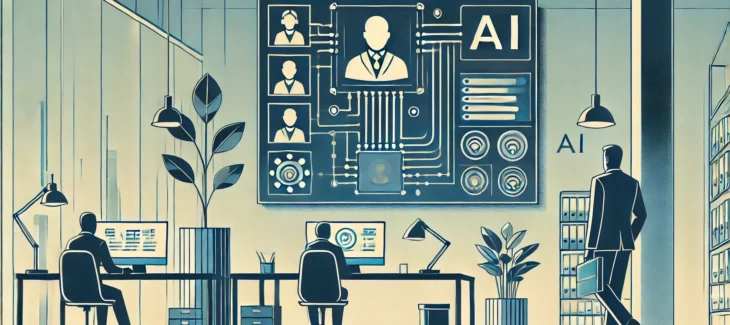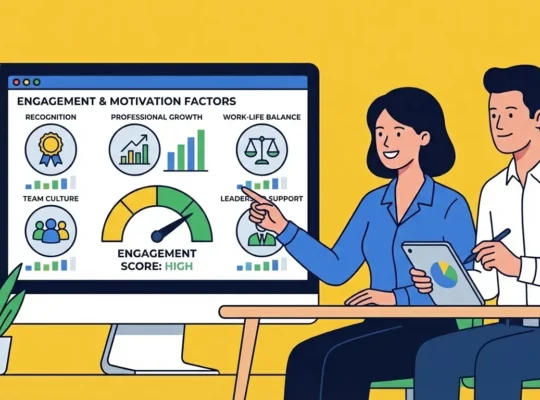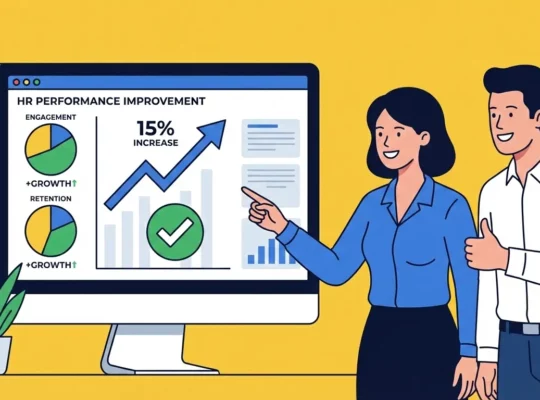AI in recruitment is revolutionizing how companies attract, evaluate, and hire top talent. The integration of artificial intelligence into the recruitment process is reshaping how organizations make data-driven decisions, streamline their hiring process, and enhance candidate experience. At Review.jobs, we recognize the value of leveraging AI to optimize hiring processes and improve employer branding through the power of authentic employee reviews.
Table of Contents
- The Evolution of Recruitment Through AI
- Key Benefits of AI in Recruitment
- Challenges and Considerations in AI-Driven Recruitment
- How Review.jobs Leverages AI to Streamline Recruitment
- The Future of AI in Recruitment: A Glimpse into Tomorrow
The Evolution of Recruitment Through AI
Historical Context
Recruitment has come a long way from manual processes, and AI has played a pivotal role in accelerating this transformation. In the early days, companies relied on print job advertisements and human recruiters to manually sift through stacks of resumes. The introduction of job boards in the late 1990s was a significant leap, allowing candidates to search for jobs online and companies to post positions more efficiently.
The next wave of innovation came with the rise of Applicant Tracking Systems (ATS), which digitized the recruitment process by automating resume sorting and storing applicant data. Fast forward to today, AI-powered recruitment platforms are taking over repetitive tasks, such as resume screening, scheduling interviews, and engaging with candidates through chatbots. AI has transformed recruitment into a data-driven, efficient, and highly personalized process.
As this technology becomes more embedded in recruitment strategies, companies can make more informed hiring decisions, ensuring long-term success and better alignment with the company’s talent acquisition recruitment goals.
Current AI Trends in Recruitment
Artificial intelligence (AI) is revolutionizing the recruitment industry, transforming the way companies attract, assess, and hire talent. Here are some of the latest AI trends in recruitment:
Chatbots for Candidate Engagement
- 24/7 Support: AI-powered chatbots offer instant communication with candidates, answering frequently asked questions and providing guidance throughout the application process.
- Personalized Experience: Chatbots can tailor interactions to each candidate, providing personalized recommendations and information.
- Improved Candidate Experience: By offering quick and efficient responses, chatbots can enhance the overall candidate experience.
AI-Powered Resume Screening and Candidate Matching
- Efficient Screening: AI systems can quickly analyze large volumes of resumes, identifying candidates with the most relevant skills and experience.
- Accurate Matching: By using machine learning algorithms, AI can accurately match candidates to job descriptions, reducing the time and effort required for manual screening.
- Reduced Bias: AI can help eliminate unconscious bias in the hiring process by focusing solely on objective qualifications and skills.
Predictive Analytics for Long-Term Employee Success
Predictive analytics is a powerful tool that can revolutionize the hiring process. By analyzing historical data, these tools can identify patterns and predict which candidates are likely to succeed in specific roles.
How Predictive Analytics Works
- Data Collection: Gather historical data on employee performance, tenure, and other relevant factors.
- Pattern Recognition: Machine learning algorithms are used to identify patterns and correlations within the data.
- Predictive Modeling: Develop models that can predict future outcomes based on these patterns.
Key Benefits of Predictive Analytics
- Data-Driven Hiring: Make more informed hiring decisions based on objective data and insights.
- Identify Top Talent: Pinpoint candidates with the highest potential for long-term success.
- Reduce Turnover: Hire the right people from the start to minimize turnover and improve employee retention.
Enhancing Diversity Hiring
Artificial intelligence (AI) is playing an increasingly important role in modern recruitment practices. By leveraging AI-powered tools, organizations can enhance diversity hiring efforts and create more inclusive workplaces.
1. Eliminating Bias
- Objective Assessment: AI can help eliminate unconscious bias by focusing solely on candidate qualifications and skills, rather than subjective factors such as personal preferences or stereotypes.
- Data-Driven Decisions: By using data-driven algorithms, AI can identify patterns and trends that may not be apparent to human recruiters.
2. Prioritizing Diversity
- Diverse Candidate Pools: AI can help organizations identify and attract candidates from diverse backgrounds, including underrepresented groups.
- Inclusive Hiring Practices: By using AI to automate certain tasks, organizations can create a more inclusive hiring process that is free from bias and discrimination.
3. Improving Candidate Experience
- Personalized Interactions: AI-powered chatbots can provide personalized interactions with candidates, making them feel valued and appreciated.
- Efficient Processes: AI can streamline the hiring process, reducing the time it takes for candidates to hear back from companies.
- Transparent Communication: AI-powered tools can help ensure that candidates receive clear and timely communication throughout the hiring process.
Key Benefits of AI in Recruitment
Artificial intelligence (AI) is transforming the way we recruit talent, offering numerous benefits for organizations of all sizes. By automating repetitive tasks and providing valuable insights, AI can help you streamline your recruitment process, improve candidate experience, and attract top talent.
1. Improved Efficiency
- Automated Resume Screening: AI-powered tools can quickly analyze large volumes of resumes, identifying the most qualified candidates based on specific criteria. This saves recruiters time and effort, allowing them to focus on more strategic tasks.
- Streamlined Scheduling: Automated scheduling systems can efficiently book interviews, reducing back-and-forth communication and ensuring timely appointments. This eliminates the need for manual scheduling and reduces administrative overhead.
- Instantaneous Responses: AI-powered chatbots can provide instant answers to candidate questions, ensuring a positive and responsive candidate experience. This can help to reduce the time it takes to fill open positions and improve candidate satisfaction.
2. Enhanced Candidate Experience
Candidates expect a seamless and responsive hiring process. AI tools help personalize the recruitment journey by:
Providing Instant Responses
- 24/7 Support: AI-powered chatbots can offer instant responses to candidate inquiries, even outside of regular business hours.
- Reduced Wait Times: Candidates no longer have to wait for human representatives to respond to their questions, leading to a more efficient and satisfying experience.
Offering Personalized Recommendations
- Tailored Job Suggestions: AI algorithms can analyze candidate profiles to recommend relevant job openings, increasing the chances of finding the right fit.
- Enhanced Relevance: By providing personalized recommendations, AI can help candidates discover opportunities they may not have considered otherwise.
Streamlining Communication
- Automated Notifications: AI can send automatic notifications to candidates, keeping them informed about the status of their application.
- Efficient Scheduling: AI-powered tools can schedule interviews and other appointments, reducing administrative overhead and ensuring timely communication
3. Data-Driven Decision Making
AI is revolutionizing the way recruiters make hiring decisions by providing access to vast amounts of data and powerful analytics tools. By leveraging AI, recruiters can:
- Analyze Candidate Data: Gain deeper insights into candidate qualifications, skills, and experience.
- Identify Patterns and Trends: Uncover hidden patterns and trends in candidate data to inform hiring strategies.
- Make Informed Decisions: Base hiring decisions on objective data rather than subjective impressions.
4. Bias Reduction
One of the most significant benefits of AI in recruitment is its ability to reduce bias. Unlike human recruiters who may be influenced by unconscious biases, AI algorithms can focus solely on objective data, such as:
- Skills and Qualifications: AI can accurately assess a candidate’s skills and experience, regardless of their background or demographic information.
- Job Requirements: AI can match candidates to job requirements based on objective criteria, eliminating the potential for bias in the selection process.
- Historical Data: By analyzing historical hiring data, AI can identify patterns and biases that may be present in the recruitment process.
Challenges and Considerations in AI-Driven Recruitment
Bias in AI Algorithms
Despite its advantages, AI is not immune to bias. If trained on biased data, AI can inadvertently reinforce discrimination in hiring decisions. For example, if historical data shows a preference for male candidates in technical roles, AI might perpetuate that trend. Therefore, companies must ensure their AI systems are trained on diverse and representative data to promote ethical AI practices.
Addressing Bias in AI Algorithms
- Diverse Training Data: Ensure that AI algorithms are trained on a diverse and representative dataset to prevent bias from being perpetuated.
- Regular Audits: Conduct regular audits of AI systems to identify and address any biases that may arise.
- Human Oversight: Maintain human oversight to ensure that AI decisions are fair and ethical.
Human Touch vs. AI
While AI excels at efficiency, some aspects of recruitment still require a human touch. Personal connections, emotional intelligence, and understanding cultural fit are areas where human recruiters outperform machines. The ideal recruitment strategy combines the speed and accuracy of AI with the empathy and insight of human recruiters.
Balancing Human Touch and AI
- Leverage AI for Efficiency: Use AI to automate routine tasks, such as resume screening and scheduling interviews.
- Prioritize Human Judgment: Reserve human judgment for tasks that require empathy, cultural understanding, and complex decision-making.
- Create a Hybrid Approach: Combine the strengths of AI and human recruiters for a more effective and efficient recruitment process.
Data Privacy and Compliance
The use of AI in recruitment also raises data privacy concerns. Companies must comply with data protection regulations such as the General Data Protection Regulation (GDPR). This means ensuring candidate data is handled securely, and AI systems must be designed to protect sensitive information.
Ensuring Data Privacy and Compliance
- Adhere to Regulations: Comply with data protection regulations like GDPR to protect candidate data.
- Implement Security Measures: Use robust security measures to safeguard sensitive information.
- Obtain Informed Consent: Obtain explicit consent from candidates before collecting and processing their data.
How Review.jobs Leverages AI to Streamline Recruitment
At Review.jobs, we understand the critical role of AI in transforming the recruitment landscape. Our platform leverages advanced AI technology to offer a suite of powerful features that can help you attract top talent, enhance your recruitment branding, and streamline your hiring process.
Key Benefits of Using Review.jobs:
- AI-Driven Insights: Our platform analyzes employee reviews to provide actionable insights into your company culture, helping you attract candidates who are a perfect fit.
- Automated Review Management: Streamline the process of collecting, analyzing, and managing employee reviews, saving you time and effort.
- Data-Driven Decision Making: Our AI-powered reporting tools offer valuable analytics to inform your recruitment strategies and make data-driven decisions.
- Enhanced Employer Branding: Showcase your company’s positive employee reviews to attract top talent and build a strong employer brand.
By leveraging the power of AI, you can:
- Improve candidate experience: Provide a more personalized and efficient application process.
- Reduce time-to-hire: Streamline the hiring process and make faster hiring decisions.
- Enhance diversity and inclusion: Use AI to identify and attract candidates from diverse backgrounds.
- Make data-driven decisions: Gain valuable insights into your recruitment process and make informed decisions based on data.
The Future of AI in Recruitment: A Glimpse into Tomorrow
Artificial intelligence (AI) is rapidly transforming the recruitment landscape, with new trends emerging constantly. Here’s a look at what the future holds for AI in recruitment:
1. Virtual Reality Interviews: A New Frontier
- Immersive Experiences: AI-powered virtual reality (VR) technology is creating immersive interview experiences that allow companies to assess candidates in realistic job scenarios.
- Enhanced Assessment: VR interviews can provide valuable insights into a candidate’s problem-solving skills, communication abilities, and cultural fit.
- Reduced Bias: VR interviews can help eliminate biases that may arise in traditional face-to-face interviews.
2. AI-Powered Employee Retention Predictions
- Proactive Measures: AI can analyze data from the hiring process, employee performance, and engagement metrics to predict which employees are likely to stay or leave.
- Targeted Retention Strategies: By identifying at-risk employees early on, companies can implement targeted retention strategies to prevent turnover.
- Improved Employee Experience: AI-powered retention predictions can help organizations create a more positive and supportive work environment.
3. AI’s Expanding Role in Employee Lifecycle Management
- Onboarding and Training: AI can personalize onboarding experiences and recommend relevant training programs based on employee skills and career goals.
- Performance Reviews: AI can automate performance reviews, providing objective feedback and identifying areas for improvement.
- Career Development: AI-powered tools can help employees identify career paths, set goals, and develop the necessary skills to advance their careers.
The rise of AI in recruitment is transforming how businesses approach hiring. By automating tasks, providing data-driven insights, and enhancing the candidate experience, AI is enabling recruiters to make more informed decisions while improving efficiency. At Review.jobs, we leverage AI-driven tools to streamline the recruitment process and help companies build stronger employer brands. HR professionals and business leaders should explore AI solutions like ours to stay ahead in the competitive recruitment landscape.





